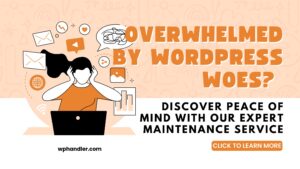Understanding the Importance of Regular Maintenance
Why Maintenance Matters
As someone who’s been in the web development space for years, I can’t stress enough how crucial regular maintenance is for your WordPress site. Think of it like taking your car for an oil change. Ignore it, and eventually, you’re gonna have some serious problems, right? Well, the same goes for your website. Regular upkeep keeps everything running smoothly and reduces the risk of headaches down the road.
Websites are like living entities; they need care and attention. Software updates, backup routines, and security checks are all part of giving your site the love it deserves. Without these, you’re leaving your site vulnerable, and let’s face it, a hacked site is the last thing you want on your to-do list!
Routine care leads to better performance, a faster site, and improved SEO. A well-maintained site retains visitors, which translates into better engagement and sales opportunities. So, make regular maintenance a priority, and your website will thank you.
Staying Up-to-Date with Plugin and Theme Updates
Keeping Plugins Fresh
Over the years, I’ve seen countless site owners neglect their plugins. Why? Because updating them sometimes feels like an extra chore to add to an already overflowing to-do list. But here’s the thing: outdated plugins can lead to security vulnerabilities. Regularly updating your plugins ensures that you’re not just protected from bugs and performance issues, but also from potential security breaches.
Plus, plugin developers continually improve their products. With every update, you may find new features that can enhance your site. So, invest a few moments each month to check for plugin updates. It’s a small effort that pays big dividends!
Remember to test updates on a staging site whenever possible. This way, you can catch any compatibility issues before they wreak havoc on your live site. A little bit of caution can save you a major headache later on.
Backing Up Your Website Regularly
The Heart of Your Safety Net
If there’s one thing I can say from experience, it’s that backups are non-negotiable. You never know when something will go sideways—be it a server crash or even a small human error. Backing up your website regularly means that you have a safety net to fall back on.
There are plenty of plugins and external services out there to automate backups. Honestly, make sure to set it and forget it. You don’t have to remember to do this manually. I personally use one plugin that sends backups to cloud storage, and I can sleep easy knowing my site’s data is safe.
Always keep multiple backup copies—preferably in different locations. If something happens to one backup, you’ve got options! This is a simple, stress-free way to ensure your hard work isn’t lost forever.
Monitoring Site Performance
Analytics Ensure Growth
When I first started, I didn’t pay much attention to site performance. I wish I could go back and kick myself for that! Websites need constant monitoring, and performance metrics can tell you so much about how well your site is doing—and how it could improve.
Using tools like Google Analytics to track visitor behavior, page loading speeds, and bounce rates can point you in the right direction. If you notice that users are leaving your site quickly, it might be time to optimize your content or perhaps work on speeding things up.
I also recommend conducting regular speed tests and looking into caching solutions if things are feeling sluggish. Your users will thank you for a faster experience—and Google will too!
Ensuring Robust Security Measures
Taking Security Seriously
Let’s get real for a second: website security isn’t something you can afford to ignore. I’ve seen too many cases where a site gets hacked simply due to weak security measures. Make it a point to invest in security plugins and stay updated on best practices.
Implementing HTTPS, changing default login URLs, and using strong passwords are just the basics. You’re not just protecting your site but also your visitors. Sometimes it’s easy to brush off, but don’t take your site’s security lightly. It can affect your reputation in a big way.
Regularly monitoring your site for suspicious activity is also crucial. Set up alerts in your security plugins so that you’re notified of any strange behavior. Early detection can save you from significant trouble down the line.
Frequently Asked Questions (FAQ)
What is the main purpose of WordPress maintenance?
The primary purpose of WordPress maintenance is to keep your website running smoothly, secure, and up-to-date. Regular maintenance ensures optimal performance, enhances security, and minimizes the risk of downtime or data loss.
How often should I update my plugins and themes?
I recommend checking for updates at least once a month. However, if your site relies heavily on particular plugins or themes, weekly checks may be necessary to ensure everything is current and secure.
What’s the best way to back up my website?
Using backup plugins that automate the process is a fantastic way to handle backups. Alternatively, you can manually back up your site, but it requires more effort. Storing backups in multiple locations is a smart move, too.
How can I monitor my site’s performance?
Use analytics tools like Google Analytics to understand visitor behavior and performance metrics. Regularly conducting speed tests with tools like GTmetrix can also highlight areas needing attention.
What security measures should I implement?
Essential security measures include using strong passwords, enabling HTTPS, regular updates, and utilizing security plugins. Monitoring for suspicious activity will also keep your site safe from potential attacks.

